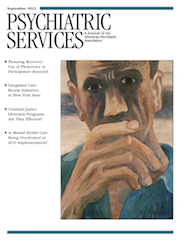Medication Continuity Among Medicaid Beneficiaries With Schizophrenia and Bipolar Disorder
Abstract
Objective
This study was conducted to examine whether medication continuity among Medicaid beneficiaries with schizophrenia and bipolar disorder was associated with medication utilization management practices (prior authorization, copayment amounts, and refill and pill quantity limits), managed care enrollment, and other state and beneficiary characteristics.
Methods
With 2007 Medicaid Analytic Extract claims data from 22 states, random-effects logistic regression modeled the odds of high medication continuity, defined as receiving medications for at least 80% of the days enrolled in Medicaid, among beneficiaries ages 18–64 with a diagnosis of schizophrenia (N=91,451) or bipolar disorder (N=33,234).
Results
Sixty-four percent of beneficiaries with schizophrenia and 54% of beneficiaries with bipolar disorder had high medication continuity. Medication continuity was worse among beneficiaries with schizophrenia in states that required prior authorization for antipsychotics, $2–$3 copayments for generic medications, or $1 copayments for branded medications (compared with no copayments). For beneficiaries with bipolar disorder, medication continuity was worse among those in states with more prior-authorization requirements for different classes of medications or $1 copayments for branded medications. Medication continuity was worse among beneficiaries who were African American, Hispanic, younger, or enrolled in a health maintenance organization health plan or who had a comorbid substance use disorder or cardiovascular disease.
Conclusions
Prior-authorization requirements and copayments for medications may present barriers to refilling medications for Medicaid beneficiaries with schizophrenia or bipolar disorder. State Medicaid programs should consider the unintended consequences of medication utilization management practices for this population.



